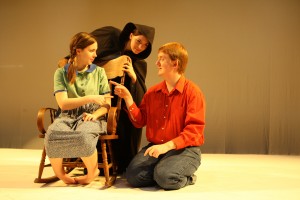Holly Blumner had a vision. A member of the St. Mary’s theater department, Holly wanted to stage a young adult play and then take it into area schools.
This post tells the story about how rightwing groups have so terrified our schools that the vision died.
Holly’s directing style, heavily influenced by Japanese theater, often has a child-like magic to it, and her version of Salman Rushdie’s Haroun and His Sea of Stories is among the top two or three productions I have seen at St. Mary’s College in my 30 years here. This time she chose Mother Hicks, a Susan Zeder play about a 13-year-old girl’s identity quest. Zeder (you can read about her here) is one of those authors of young adult literature that take children seriously. She doesn’t condescend to her audiences but figures they are capable of wrestling with difficult themes.
Mother Hicks certainly does that. Set in the small Missouri town of Illinois during the Great Depression, it features “Girl,” who was abandoned as a baby to be brought up by the townsfolk. She gets passed from house to house and, in the process, becomes tough and sassy. Ultimately she finds refuge with Mother Hicks, whom the town regards as a witch. All living creatures go to Mother Hicks to be healed, and in Girl’s case the healing is both physical (pneumonia and a cut from a rusty knife) and, more importantly, psychological (she must let go of a fantasy about her mother and find a name for herself).
One only has to look at the teenage reception of Twilight to recognize how the play touches on issues at the core of the adolescent experience. As Holly notes, “It is often those in middle school and high school that feel the most alienation, and I believe this play speaks to them.” Mother Hicks captures adolescents’ ambivalence about leaving childhood—Girl holds on to the baby blanket in which she was originally wrapped—as well as their desire to be independent. Their fantasy that another family exists that will understand them better than their own is just that, a fantasy. Girl must learn that there are those, such as the undertaker’s wife that she is now staying with, who care for her and to whom she can return.
While she must go to Mother Hicks, she can’t stay with her. After all, Mother Hicks is (according to a character who is deaf and mute) wind, fire, earth, water, blood, and meat. She is the wise old woman of Joseph Campbell’s hero’s quest, one who heals but then sends one on one’s way. Girl may fantasize about leaving her family and gaining magical powers that will solve her problems, but in the end she must return to society and reality.
The play also calls upon Girl, and upon us all, to push through stereotypes based on fear in order to find the human within us all. Mother Hicks is not a witch but a woman driven half crazy years ago by the death of her baby. The story also has a deaf and mute man who has a heart that the town can’t see. When he speaks, the entire cast becomes a kind of chorus behind him so that we see them all gesturing to us. There is another world that invites us in if we can only move past our prejudices.
So what kind of response did Holly get when she took her proposal to the public schools? Stereotypes based on fear. Here’s her account:
We met with a representative to see if we could tour the schools and after they read the script, they said no, it was not even appropriate for high school students. The witchcraft, references to chewing tobacco, the “piss on an electric fence” line, and a character drinking alcohol were “objectionable.” I was told the play was controversial. By the end of our series of conversations, the people I spoke to made it clear we were not going to receive any cooperation in reaching young audiences.
So is this America in 2011 or 1885? I mention 1885 because the response echoes, almost eerily, objections raised about Tom Sawyer and Huck Finn a century and a half ago. (Go to this post on the censorship of Huck Finn to see.) And yet, I’m not surprised. This was a school system that yielded to pressure from rightwing “Christianist” groups (I borrow the phrase from Andrew Sullivan, who makes the case that often their views have little to do with Christianity ) and prohibited school-sponsored Halloween parties when my children were going to school. (Our school avoided consorting with the devil by having a “book characters party” instead.) This was also a school system that banned the teaching of Toni Morrison’s Song of Solomon, even though the book is on the Advanced Placement reading list. (See my description of that incident here.)
As I think about it, however, I can see why such people would object to the play. After all, it is about them. There are characters in the play resembling those Americans who burn Harry Potter books and pass laws against sharia law. Our country’s hysteria over “the Other” is one target of Zeder’s drama. In certain ways Mother Hicks resembles Shirley Jackson’s The Lottery, once a high school drama staple. Is it still?
It one way, I suppose one has got to sympathize with the school system. Already stressed out from incessant testing, pay freezes, budget-reductions (leading to teacher and staff firings), helicopter parents, continuous threats of lawsuits, and the like, they want to avoid anything that makes their jobs harder.
On the other hand, their job is to educate and this is education. Young people need to learn how to negotiate the fear-based images they are being fed. If not now, when?
Go here to subscribe to the weekly newsletter summarizing the week’s posts. Your e-mail address will be kept confidential.


